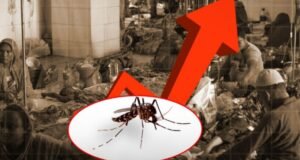
By Imran Hossain:
In a concerning development, Bangladesh finds itself grappling with a high risk of HIV infection, raising urgent alarm bells within the nation. Despite commendable efforts by the government and international organizations, the prevalence of HIV/AIDS remains a daunting challenge. This report aims to shed light on the factors contributing to the increased risk of infection and emphasizes the need for immediate action.
Recent data reveals that Bangladesh, the densely populated South Asian country, continues to battle the escalating threat of HIV/AIDS. With an estimated 12,000 people living with the virus, the situation demands swift and effective interventions. Although the prevalence rate remains relatively low compared to neighboring countries, several risk factors exacerbate the vulnerability to HIV transmission.
High population density poses a significant hurdle to healthcare and prevention efforts. Overcrowding in urban slums and rural areas hampers the implementation of vital prevention measures, making it challenging to reach the population with essential resources and information. This calls for innovative strategies tailored to the specific needs of these areas.
Stigma and discrimination against individuals living with HIV/AIDS remain prevalent in Bangladeshi society. The fear of social ostracization and marginalization prevents affected individuals from seeking testing, treatment, and support. Eradicating this stigma is crucial to encourage those at risk to come forward, access services, and prevent further spread of the virus.
A lack of comprehensive sexual education and awareness programs compounds the problem. Insufficient knowledge regarding HIV transmission, prevention, and testing results in heightened vulnerability to infection. A robust education system that addresses these gaps is imperative to empower the population with accurate information and foster responsible behaviors.
Unsafe injection practices, particularly among people who inject drugs (PWID), contribute significantly to the transmission of HIV. The absence of access to sterile injection equipment and harm reduction services leads to the sharing of needles and syringes. Urgent measures are required to provide PWID with clean supplies, along with harm reduction programs that offer counseling, testing, and treatment options.
Additionally, key populations such as sex workers, transgender individuals, and men who have sex with men (MSM) face elevated risks due to social marginalization and limited healthcare access. Tailored interventions that address the specific needs of these populations are crucial in reducing transmission rates and improving health outcomes.
In response to the escalating crisis, the Government of Bangladesh, in collaboration with national and international partners, has initiated various programs. The National AIDS/STD Program (NASP) is actively engaged in prevention efforts, awareness campaigns, condom promotion, and harm reduction strategies. The expansion of testing services, coupled with the provision of antiretroviral therapy (ART), aims to ensure early detection and improve the quality of life for those living with HIV.
Efforts are also underway to strengthen healthcare systems, enhance infrastructure, and integrate HIV services into the primary healthcare system. Advocacy campaigns, community engagement, and initiatives to combat stigma and discrimination are being championed to create a supportive environment for affected individuals.
Bangladesh acknowledges the need for international collaboration and actively seeks assistance from organizations like UNAIDS, the World Health Organization (WHO), and the Global Fund. Accessing technical expertise, funding, and support from these entities will bolster the nation’s fight against HIV/AIDS.
While Bangladesh currently maintains a relatively low prevalence rate of HIV/AIDS, the risks remain alarmingly high. Swift action and comprehensive strategies are essential to tackle the multifaceted challenges associated with prevention, testing, treatment, and addressing social and structural factors. By prioritizing the well-being and rights of affected individuals, Bangladesh can forge a path towards a healthier future for all its citizens.
 Weekly Bangla Mirror | Bangla Mirror, Bangladeshi news in UK, bangla mirror news
Weekly Bangla Mirror | Bangla Mirror, Bangladeshi news in UK, bangla mirror news







